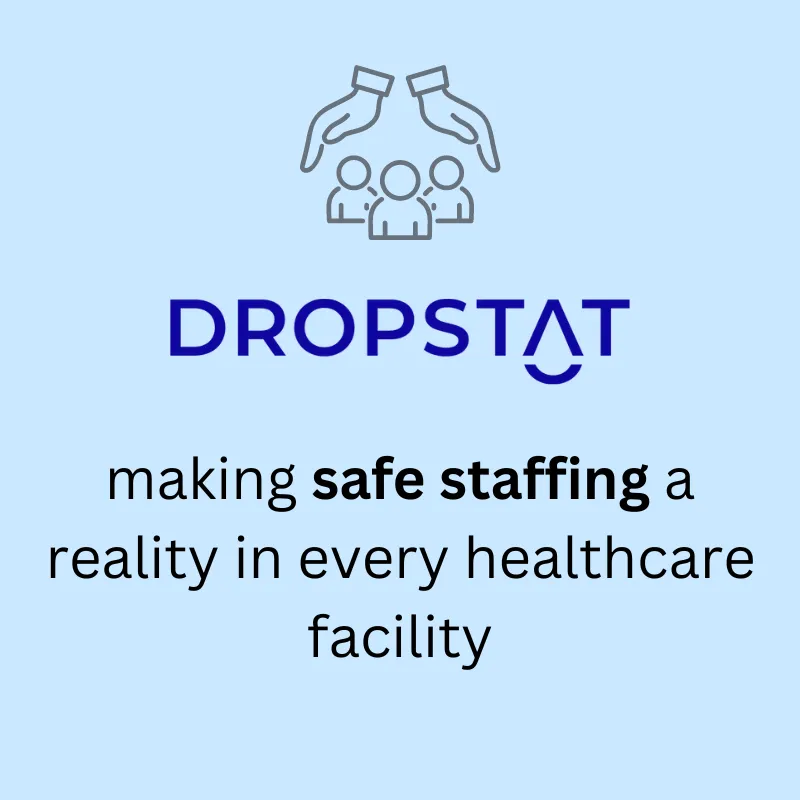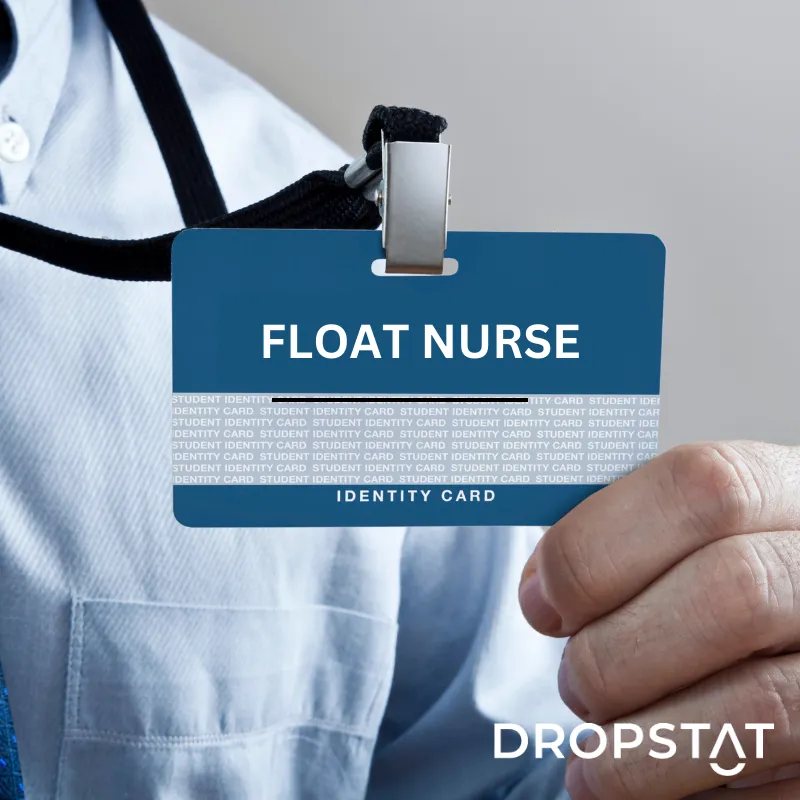Dropstat’s Clickable Guide to Types of Nursing Specialties
The main goal of float pool nursing is to limit the challenges that arise from a lack of adequate staffing while ensuring that your facility has sufficient staffing resources to meet the demands of changing patient volumes.
Which departments can a float pool nurse work in?
Float pool nurses can work in many departments within a hospital or healthcare facility based on the facility’s staffing needs. Some of the departments where float pool nurses may work include:
- Medical-surgical
- Intensive care
- Emergency
- Oncology
- Pediatric
- Neonatal
- Cardiology
In addition to these departments, float pool nurses may also work in other specialized areas such as neurology, dialysis, and mental health, among others. The specific departments where a float pool nurse works will depend on the needs of the hospital or healthcare facility and the nurse’s training and experience.
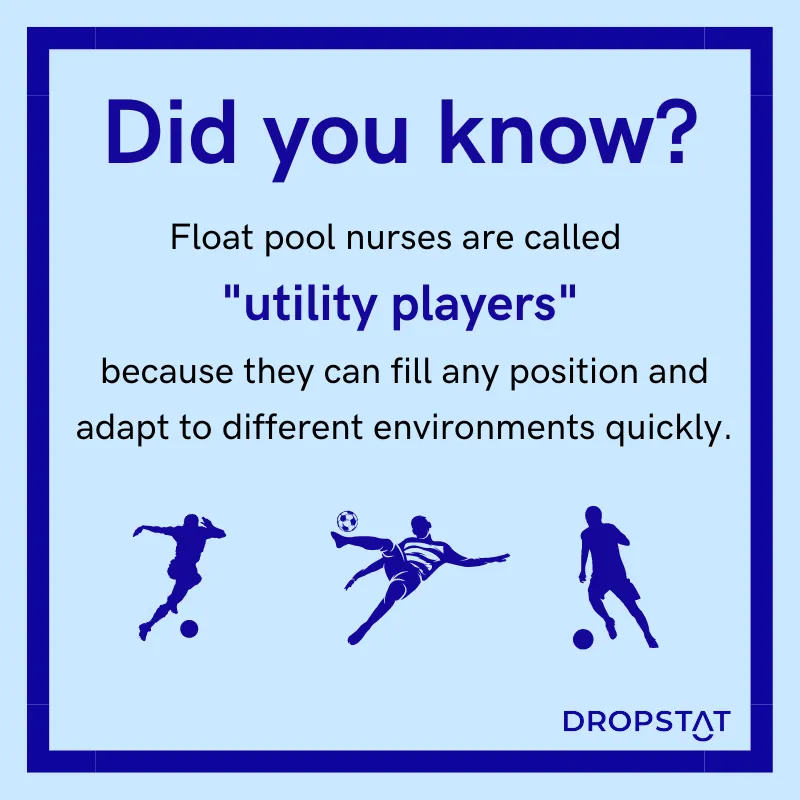
Float pool nurses’ scope of practice
Since float pool nurses are registered nurses first and foremost, their areas of expertise and clinical responsibilities often align with typical RN job duties. The main difference between RNs and float nurses is that float nurses may have to gain additional training, which depends on the facility’s demands in different departments. Organizations that use float pool nurses may require nurses to obtain training that can include:
- administering emergency drugs
- pediatric advanced life support
- advanced cardiac life support
- certification in AIDS/HIV care
- Trauma services
The average float nurse salary
A facility that chooses to implement an internal float pool will likely offer additional compensation to nursing staff who decide to take on this additional responsibility. Shift differentials may also be provided depending on the shift type and job responsibilities.
The current average float pool nurse salary in the US is $88,616. However, the salary range depends on education, location, certifications, and experience in the field. The current staffing shortages add to the growing demand for direct patient care from experienced nurses. Accordingly, when RNs obtain additional specialties, healthcare facilities can utilize their skills to offset the deficit in permanent staff.
Although there are many benefits to this specific nursing role, competitive salaries are a main factor that can incentivize RNs to become float nurses. This practice will ultimately help meet the needs of different departments to ensure safer, more targeted staffing.
Float pool nursing requirements
Float pool nurses must be licensed registered nurses who have passed the National Council licensure examination. However, additional certification and training, as well as flexibility with scheduling, are top qualities to look for in potential float nurses. It is also crucial to know the different state requirements that grant an RN eligibility to practice. For example, continuing education hours and license renewal may vary between states which can impact which potential nurses are eligible to practice as a float pool nurse.
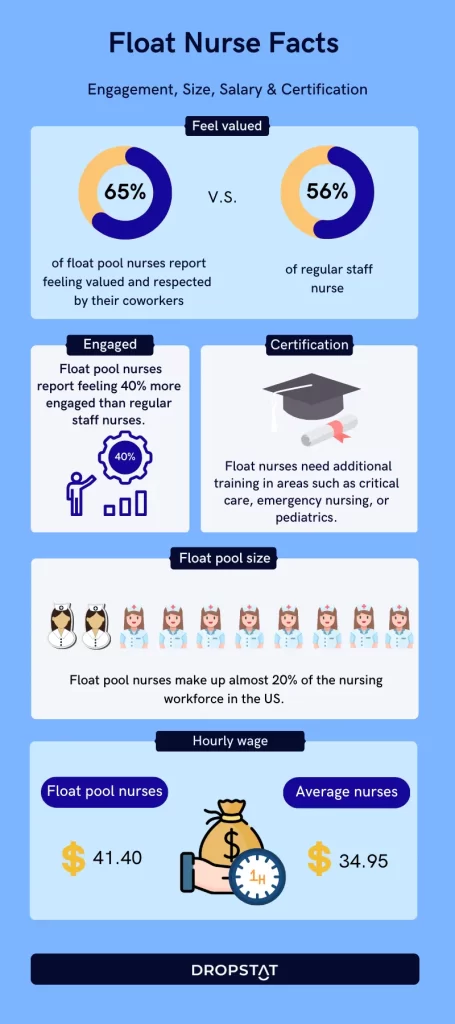
7 steps to creating an effective nursing float pool
Creating a float pool of nurses requires careful planning and organization to ensure that staffing needs are met while maintaining quality patient care. Here are 7 steps to building an effective nursing float pool:
- Determine your staffing needs: Identify the areas of your healthcare facility with the greatest need for float pool nurses. These may include critical care, emergency, medical-surgical, or specialty units. One way to ensure that your facility is aware of the exact shortages is to utilize predictive analytics software that tracks recurring staffing challenges. This data can then be used to decide which nursing roles would be most beneficial to your float pool.
- Determine your required staffing levels: Calculate the number of nurses needed for each area based on patient volume, acuity, and the required nurse-to-patient ratio.
- Choose suitable permanent staff to join a float pool who have the right qualifications to practice in other departments of your facility.
- Recruit and hire float pool nurses: If you don’t have enough internal resources to create a float pool, advertise the float pool nurse positions to attract qualified candidates. Conduct interviews to assess their clinical skills, flexibility, and ability to work in various settings.
- Develop training and orientation programs: Provide comprehensive training and orientation to your float pool nurses to ensure they have the skills required to practice in all the departments in your facility and to ensure new nurses are familiar with your facility’s policies, procedures, and patient care protocols.
- Establish scheduling protocols: Create scheduling protocols to ensure that float pool nurses are assigned to the areas where they are needed most. Develop a system for notifying float pool nurses of available shifts and allowing them to choose the shifts that work best for them.
- Monitor performance and quality of care: Regularly evaluate the performance of the float pool nurses and monitor the quality of care they provide. Adjust the staffing levels or training programs as needed to maintain high-quality patient care.
By following these steps, you can create a successful float pool of nurses that meets your staffing needs and ensures high-quality patient care.
Benefits of using a nursing float pool team
Implementing a float pool team within your healthcare institution can increase staffing flexibility and retention. Some other benefits include the following:
- ensuring safe staffing ratios throughout your facility
- reducing overtime and agency costs
- preventing turnover by investing in your staff by using float pools
- making sure that core staff in each department feel secure in their roles
- providing an extra resource for flexible scheduling, which reduces administrative pressures
Ensure safe nurse-patient ratios
The nature of the healthcare system includes constantly evolving demands that result from uncertain patient volumes. Unforeseen patient demands may also require additional staff with specific specialty areas that the scheduled healthcare team is unable to provide. In these situations, float pool nurses may be readily available to support healthcare organizations, given their additional specialty training, which makes them beneficial for multiple units. When schedulers can count on float pools to guarantee safe staffing ratios, patients receive better, more specialized care.
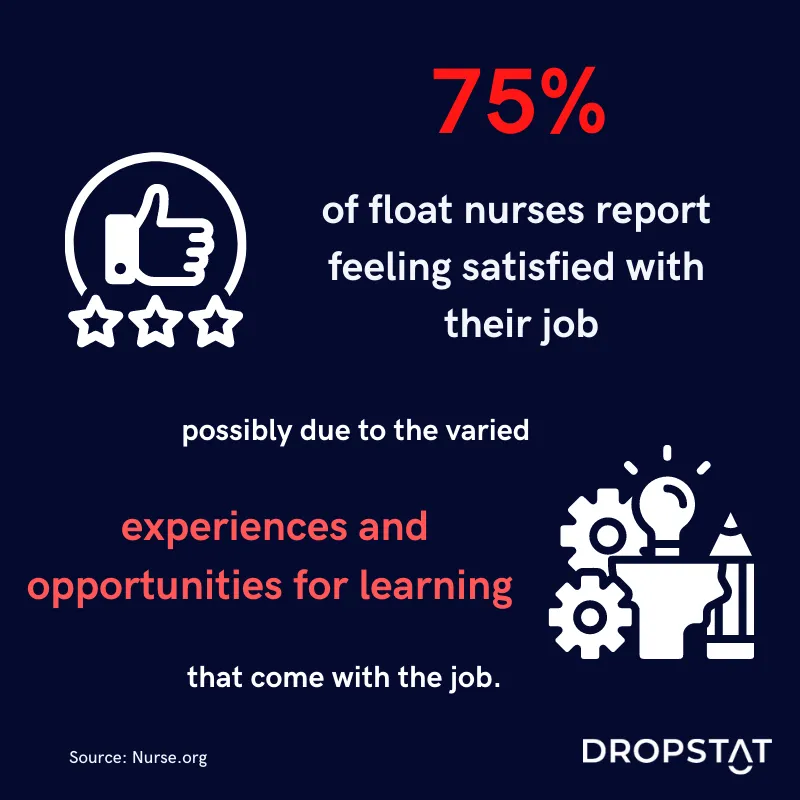
Reduce agency and overtime costs
Oftentimes, the healthcare industry will rely on agency staff and overtime shift scheduling to maintain an adequately staffed facility. However, unregulated overtime and agency use will be harmful to your institution’s cost efficiency and retention rates. However, by constructing a float pool that addresses specific departmental shortages, your healthcare facility can reduce its dependency on agency and overtime staff. In the long run, prioritizing your permanent staff over agency, and decreasing overtime shifts will help promote greater employee satisfaction and operational productivity.
Prevent turnover
Rather than scheduling your nursing staff for consecutive shifts, establishing an on-call float pool reduces undesirable scheduling for your care teams. This also enables your nurses to maintain a better work-life balance which improves nurses’ mental health and reduces chronic stress and turnover among your staff.
Help ensure that core permanent staff feel comfortable in their positions
Not only do float pool nurses enhance patient care and facility efficiency, but they also create a more comfortable work environment for core department nurses by decreasing the likelihood that non-float pool nurses will be asked to work in their unit to fill the staffing shortages.
Reduce administrative pressures
In addition to improving patient care quality and facility productivity, float pools act as an extra resource for schedulers and administrators when attempting to schedule additional staff for gap-shift management. While some facilities offer bonuses and shift differentials to persuade permanent staff to take on more shifts or potentially use agency staff, float pools give schedulers another method of ensuring that your facility is safely staffed. Ultimately, this simplifies scheduling and grants your healthcare institution the assurance that staff-patient ratios meet safety regulations.
How Dropstat can help you manage your nursing float pool
Dropstat uses AI to predict unfilled shifts well in advance and is equipped to automate shift postings to a float pool of nurses to meet patient census and safety protocols. Dropstat also uses predictive analytics to identify units or shifts with the most frequent staffing challenges. This information can enable your facility to invest in permanent staff by offering additional training so that they can be used as part of a float pool team within your organization.
Besides automated shift posting, Dropstat also incorporates an integrated messaging system to communicate open shifts with all nurses that meet the clinical competencies required for the unit. Using a messaging system to communicate departmental needs to your float pool team gives your staff a more organized and efficient float pool which improves retention and job satisfaction. Being able to rely on Dropstat for scheduling alongside integrated messaging enables your facility to use float pools as effectively as possible through a single software. Schedule a demo now and experience the Dropstat difference.
